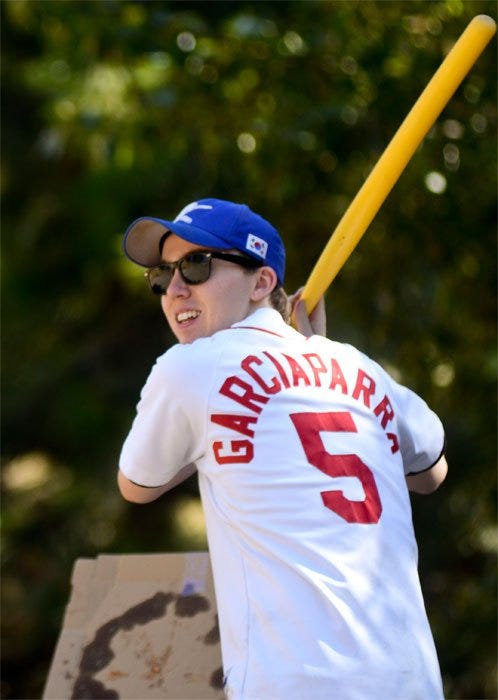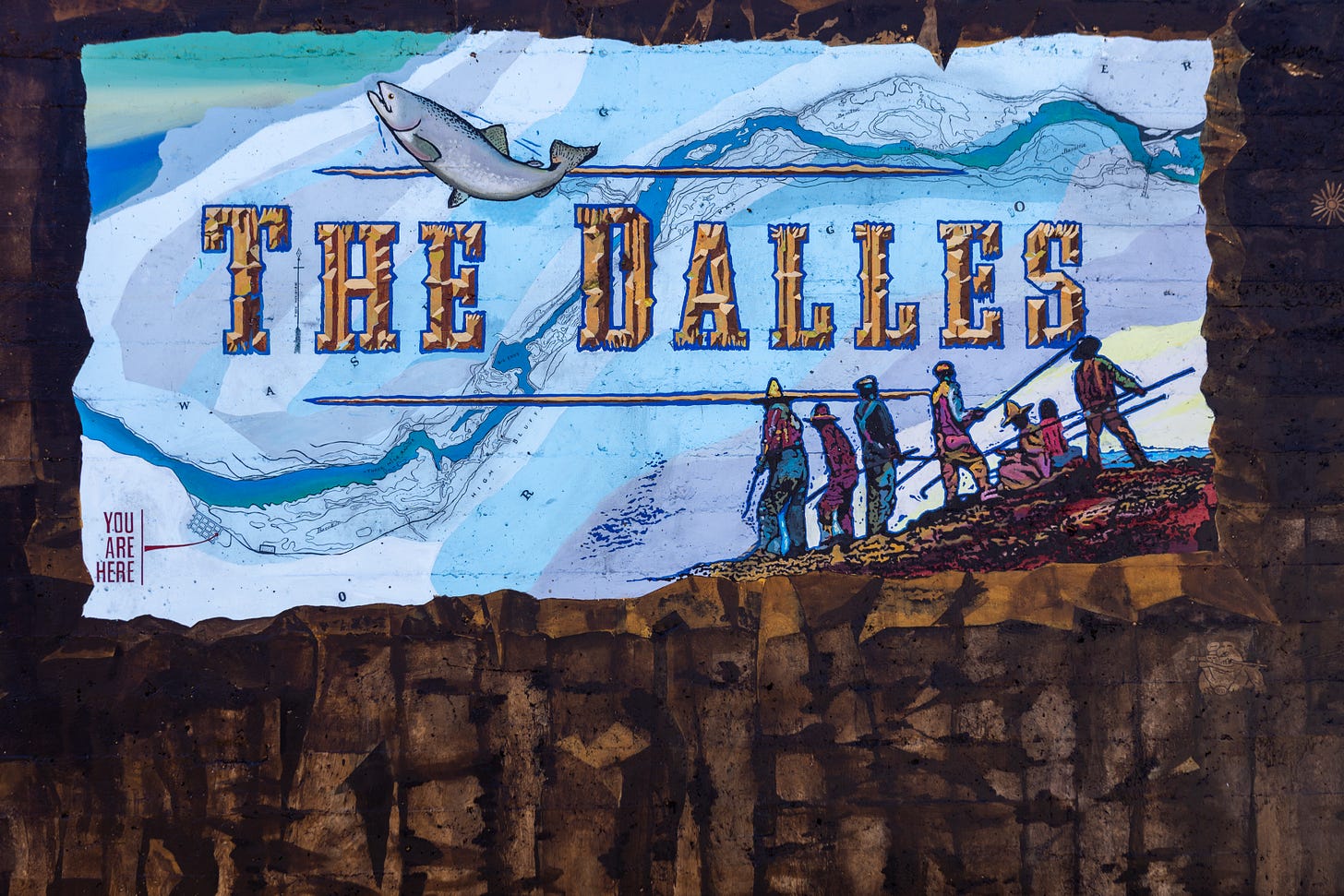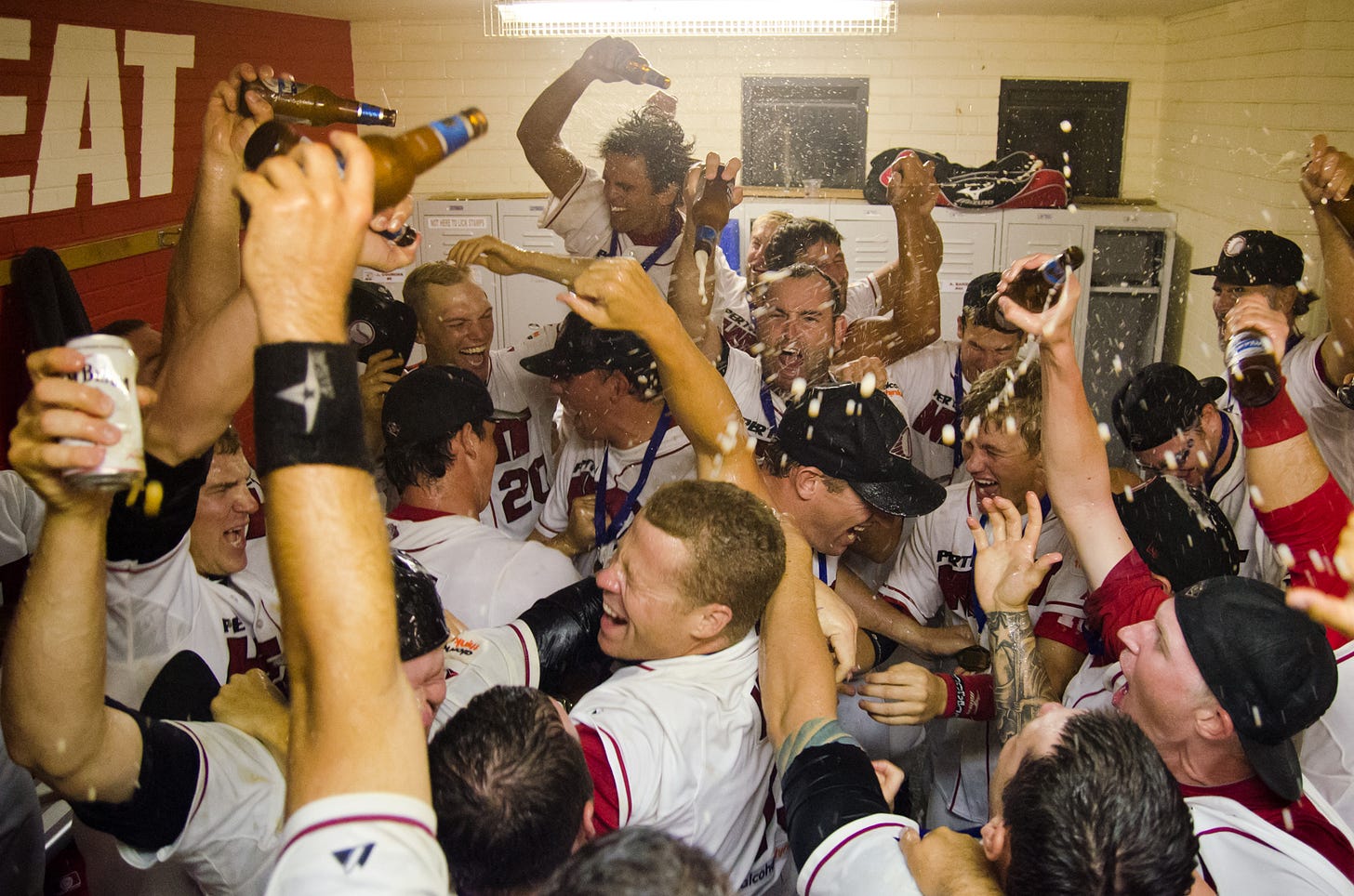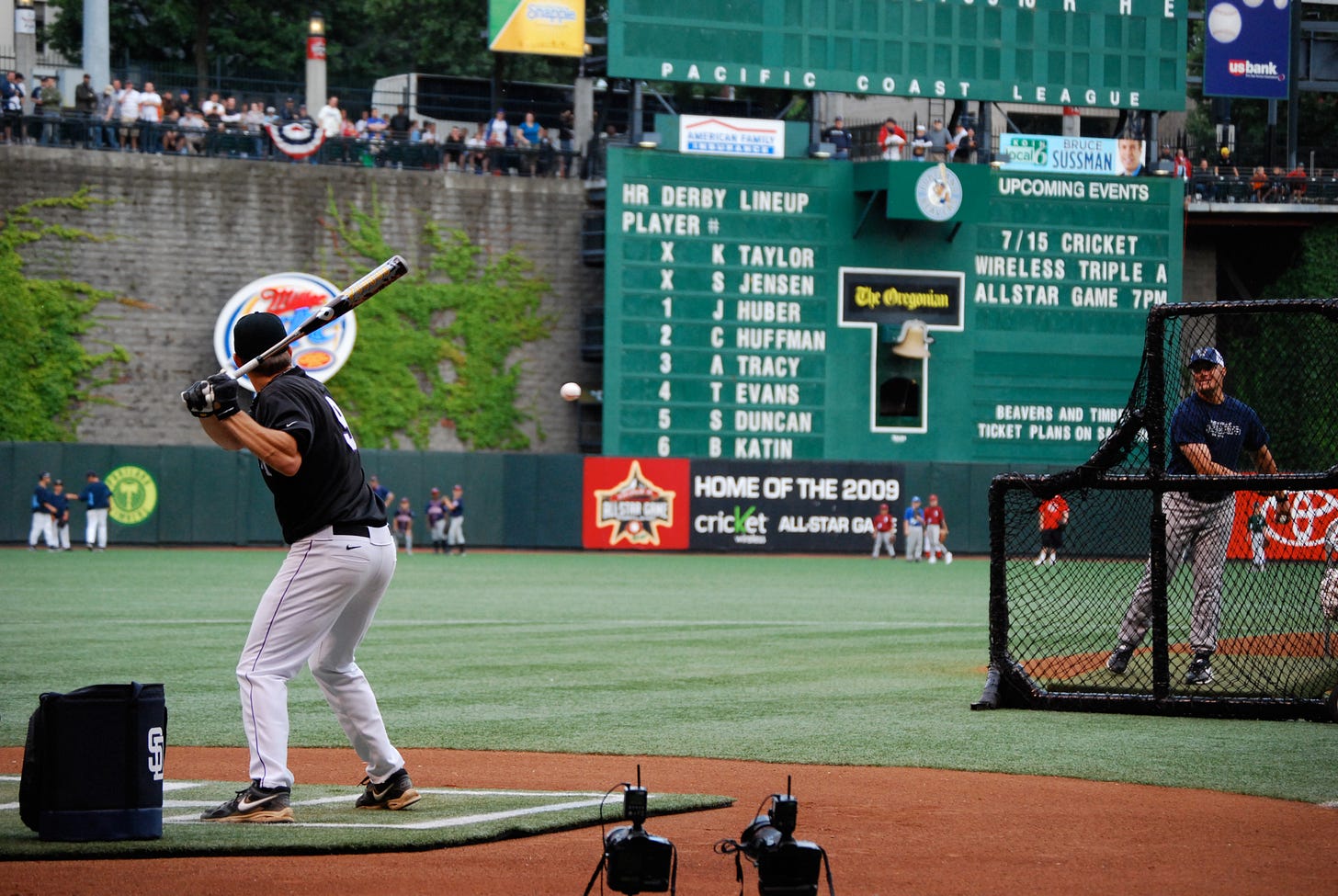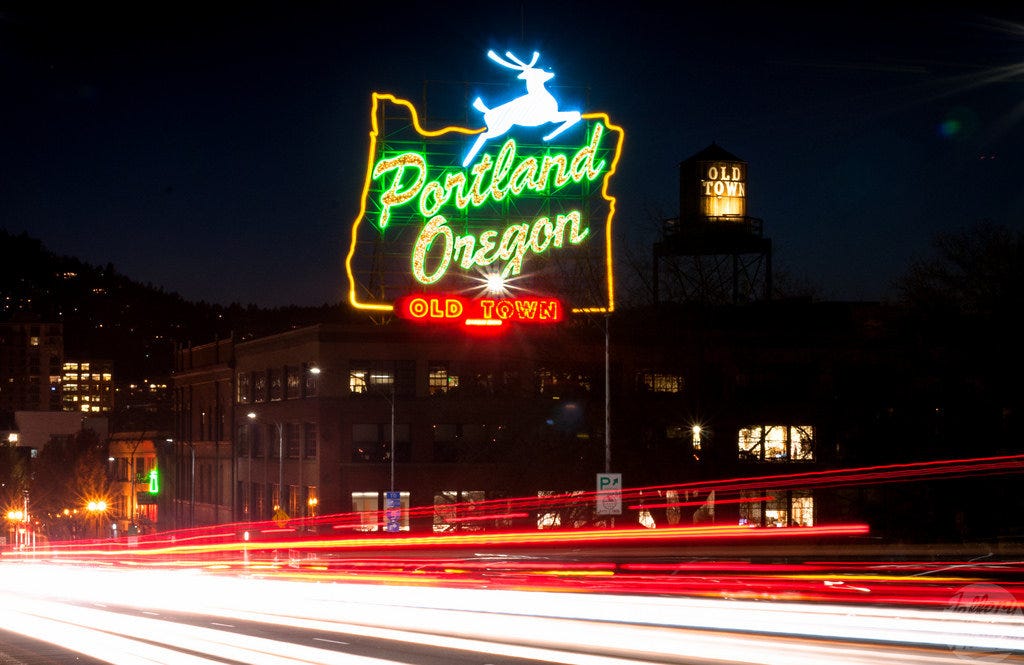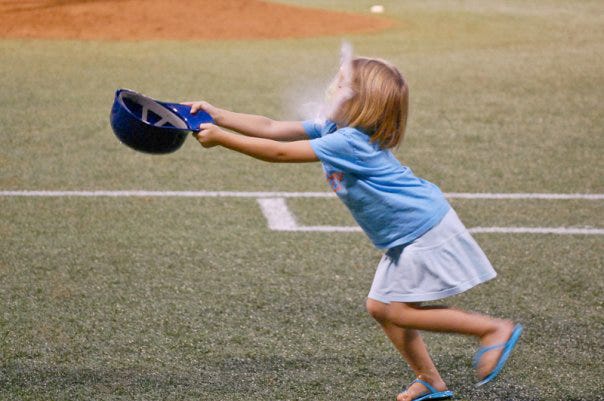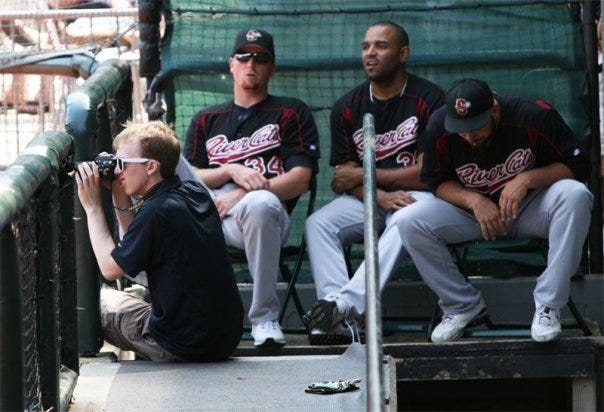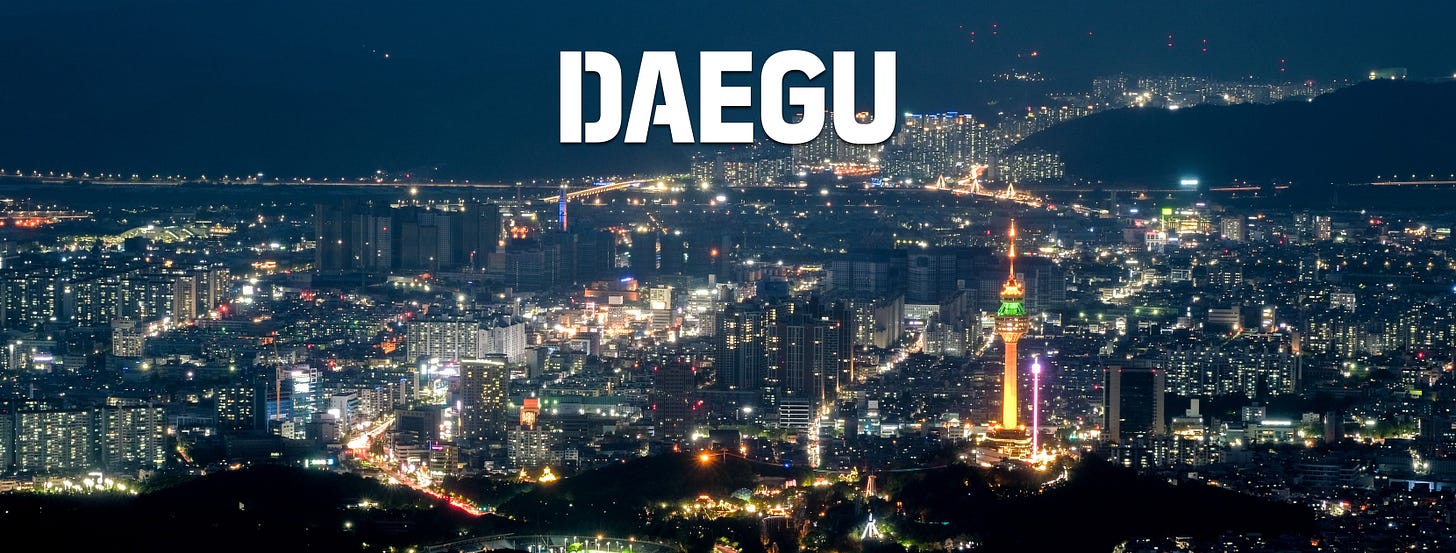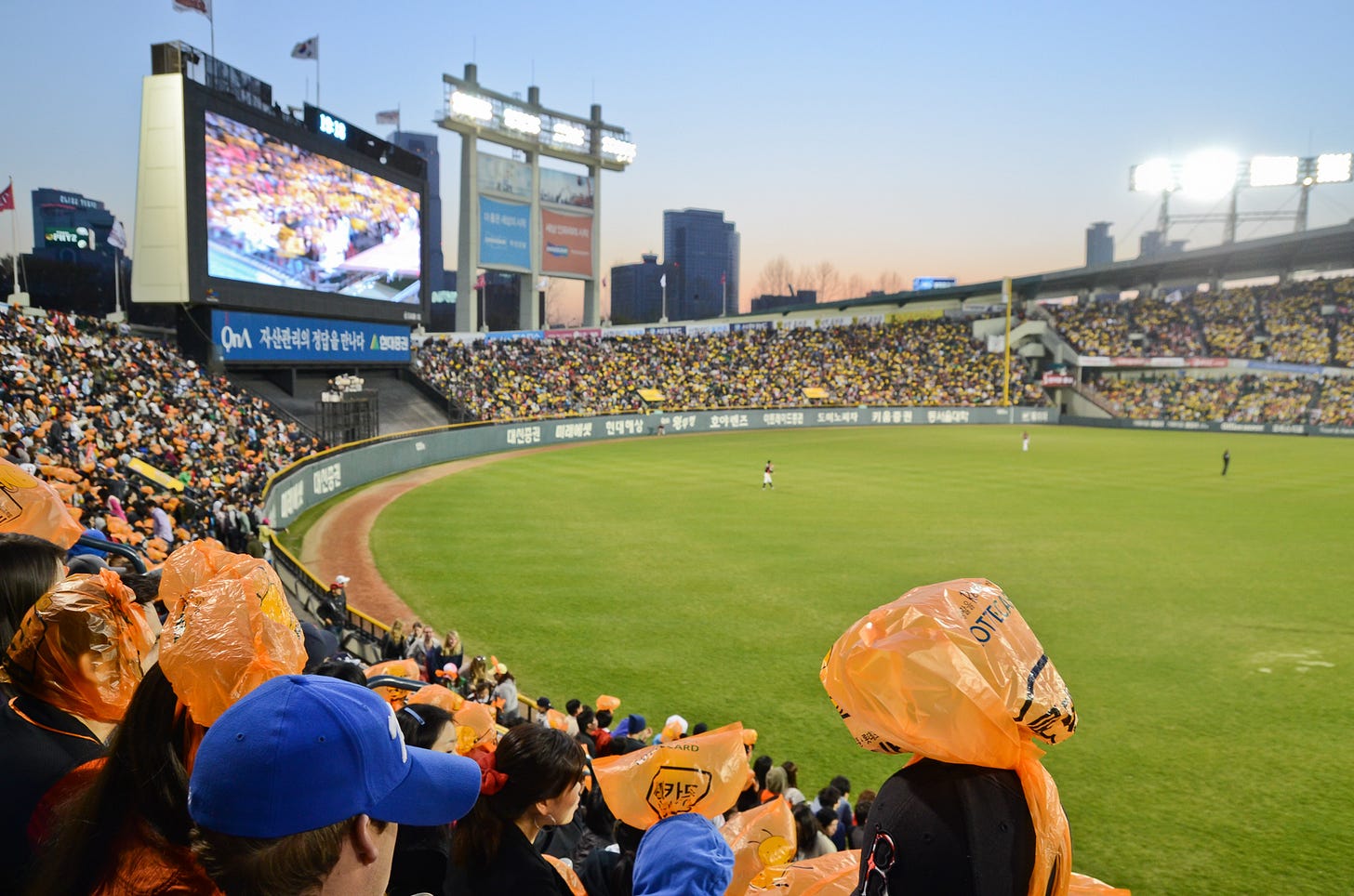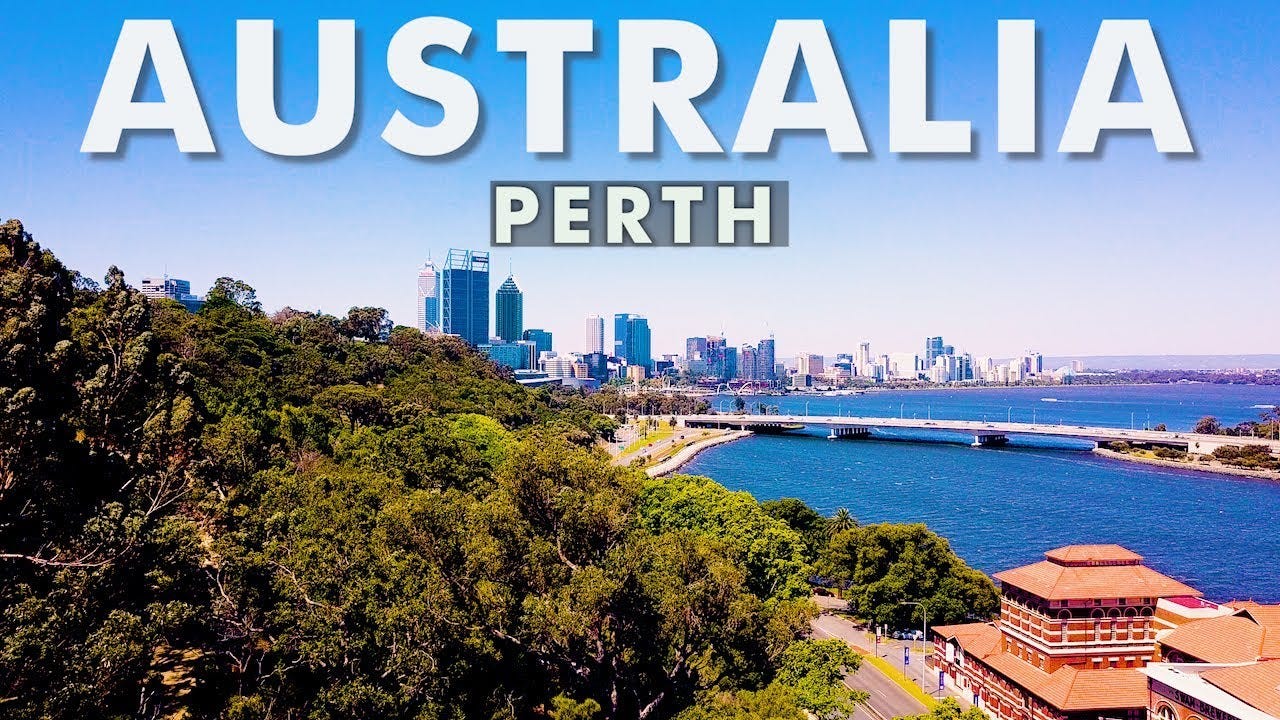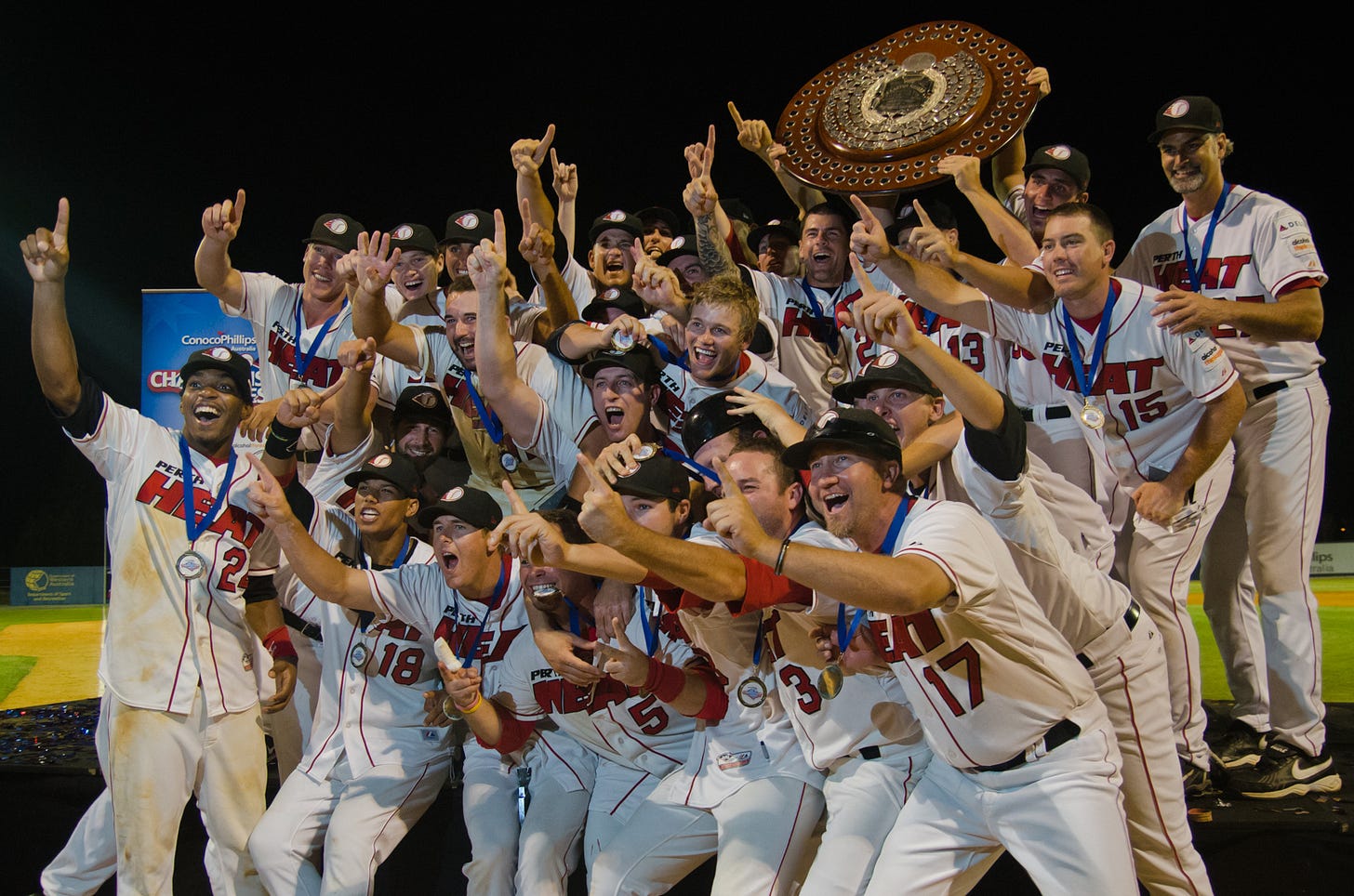Interview #13: Dylan Higgins, Global Baseball Intern
I forgot to ask if the toilets flush backwards in Australia… d'oh
Background: Dylan was born in 1987 in Walla Walla, Washington and grew up in The Dalles, Oregon, about 90 miles east of Portland. He went to college in Dartmouth and became a big baseball nerd after discovering fantasy baseball. He wound up working in baseball after college for a decade, including for entities like the Portland Beavers, Perth Heat, Pacific Coast League, MLB.com and baseball website Fangraphs.com.
In this interview we covered all of that, his year teaching English in South Korea and why he left the industry. Also, since his story covers so many global locations, like some knockoff James Bond movie, I’m replacing the section headers with location title cards like in the films. Gotta keep this fresh 10 articles in…
How did you become a baseball fan living in The Dalles?
“I liked baseball growing up. My parents were into baseball, and then around high school was a good time to become a bandwagon Red Sox fan. I'm from Oregon, so I never really had a hometown team and the Seattle Mariners were like, kind of by default, the Northwest team, which was also, growing up, a good time to like the Mariners with Ichiro and even A-Rod at the time, and Randy Johnson and just, you know, late 90s, early 2000s Mariners were great. Going to school on the East Coast, it was a very easy transition into liking the Red Sox, not just for bandwagon reasons, but hating the Yankees made for a very easy transfer.
I played Little League ‘til about 3rd or 4th grade and had one of those bad coaching experience years where like, we were in 3rd grade and the coach really wanted to win, so I got benched for not being good and my mom was like they're nine. Like, what are we doing here? And unfortunately it ruined it for me but also like, I mean, I wasn't a good athlete. I wasn't gonna go anywhere with it. I didn't try to play in high school or anything, so it's not like I had big dreams dashed or anything.
When I was in college, I got invited to my first fantasy baseball league. That changed everything for me, just both making it a game and really diving into statistics and so much of my baseball fandom has been through statistics and research and fantasy baseball for sure. I play less fantasy baseball now, but it's still such an entryway to loving baseball and all 30 teams in it, and not just one or two teams, but really like wanting to follow everything. And so I got really into fantasy baseball in college.
Fantasy baseball was the meeting of like, you can like baseball and also play a game. And I especially like games involving math and research and learning more about why this and that works, and trying to get an edge over your opponents because you studied harder or whatever. I dove way into fantasy baseball those first few years for sure. And that made you go, oh, there's not just a Red Sox player I like, or a Mariners player. It's like, oh, I love Eric Byrnes (note: who didn’t love Eric Byrnes?) or I love guys that I never would have had any reason to follow. And they go oh, this guy's a character. Oh, this guy's really good.”
There was a time in my life where fantasy baseball draft day was Christmas
“There was a time in my life where fantasy baseball draft day was Christmas, you know. I'm in one league now and it's not that serious but there was a time in my life where that was the big day of the year, when you get to do your auction and get your team together.
Give me your favorite baseball memory
“I might cheat and give you a few. The sentimental one is, when I was near the end of college, my dad and I actually went to a game at Fenway. And so getting to go to a baseball game on the East Coast with my dad was pretty cool. It's the only time either of us had been to Fenway because we're both from the Pacific Northwest. So getting the go see that was a pretty cool in-person baseball moment.
I went to school in New Hampshire (Dartmouth). And so being out there, I hadn't made it to Fenway yet and was kind of like, oh, if I'm going to leave the East Coast I need to make it while I still can. And so my dad came and we went and made the arrangement to do that, which is tricky without a car and stuff. But yeah, I got to go see Boston and go see Fenway. Yeah. So that would have been like 2007-ish.
But I think my default is, I interned in Australia for the Australian Baseball League. I was with the Perth Heat of the Australian Baseball League and the season I was there we won a championship, so I have a championship ring. I've been in the beer shower afterwards and the celebration and I got a ring even though I was the media relations manager. But I was with that team, so I suppose that has to be up there for sure in terms of lifetime memories.”
“The other honorable mention that still sticks in my head a lot, and I think you'll remember this too… in 2009, with the Portland Beavers, that All-Star game that we interned at. Do you remember… they had the high school kids come and hit in the Home Run Derby for fun. And they let guys participate, and the best ones got to do it at the Triple-A All-Star game. And there was this high school kid who just went off in the first couple rounds and there was actual risk of oh no, is a high school kid gonna win our minor league triple-A Home Run Derby? I think they’re using metal bats but this like 17-18 year old was banging ‘em off the side of the members only (Multnomah) Athletics Club. I remember that just in terms of a crazy baseball thing of this high school kid and the minor league Home Run Derby, just like I remember the people running it were like we didn't account for what if he wins. Like, is he eligible? Can that happen? Like they just assumed they did a few and it’d be fun. And he, I think if memory serves, ran out of gas in the semis, but it was really impressive.”
Note: In 2009, after Friday home games they would have a couple high school players do a home run derby and the top 2 hitters got to participate in the Triple-A Home Run Derby during All-Star week that year in Portland. So the two high school participants were Sid Jensen of Hillsboro High School and Kevin Taylor of Sunset High School, along with 3 Pacific Coast League players and 3 International League players. Taylor hit 8 homers in the first round before getting knocked out in the 2nd round.
“Once I finished college I was like, uh-oh, now I got to find a job? I don't know what I want to do. I was just focused on graduating. I would see postings for a scoreboard operator and in my head I'm like well, it's not a career, but that's a job to do around something fun that doesn't involve having to get an actual job yet. And so yeah, my first job out ended up my internship as a photography intern with the Portland Beavers (triple-A team) and the Portland Timbers (USL soccer team, now MLS team today) and taking pictures of the games and the team. So yeah, I mean, I was 21, 22… I didn't know what I wanted to do. I knew I liked being around baseball a lot, and it truly did not occur to me until right around when I graduated like, oh, you can actually, like, do this. You know, not easily. But you can try to go do this and be around it. I reasoned with myself that this is similar to grad school and that it's a way to get your foot in the door and get started on something like that.”
“That winter I did an internship with the Portland Winterhawks (WHL hockey team). I didn't like hockey as much as baseball, but I liked it enough and I liked working in sports and still didn't want to get a job. And the whole idea was I'll wait ‘til next season and then I'll get a real baseball job that will pay me full time, and I'll be all set. And that didn't happen because it's very hard to get full-time paying jobs in baseball, even off of a successful internship or two.
I was like, when baseball season starts up in the spring, I'll get a full time baseball job. And that didn't happen. I had a summer to kill and I ended up doing my second baseball internship down in Eugene. I had a friend that lived down there and I interned with the Eugene Emeralds, doing photography stuff again and then getting my feet wet with some media relations stuff. They’re kind of all-hands-on-deck and that was really fun.”
“I lived in Korea for a year. I taught in an English elementary school. I was the only foreigner in the building, and that was a really incredible experience. But by the end of my year there, I kind of understood and knew like, I liked teaching. I had a really good time. I could probably do it for some more years, but I didn't think I could do it for 30 years. Once again, trying to figure out what I was going to do in my life and I missed baseball. I mean, I went to baseball games in Korea, but I missed working in baseball.”
What is the baseball culture like in South Korea?
“I went to about 3 or 4 baseball games in Korea and had a really good time. If you’re ever in Asia, go see baseball. It is really fun. I lived in a city called Daegu, which is only like 1,000,000 people in Korea (note: actually 2.4million, just a small hamlet, really), and they have a team called the Samsung Lions. The year I got there they went to the Korea Series and won. I got to go to one of those games in the series and it was like, 15 bucks to get in, 20 bucks or something and Korean baseball stadiums are, for the most part, general admission. There are no restrictions on bringing in food and drink, other than no glass bottles. But if you want to bring a six-pack of beer and a pizza, like cool, do you have your ticket? Can I check your ice chest and make sure there's no glass? Great. Go on in. And then there's cheerleaders and everybody singing songs. Had a really good time going to baseball games in Korea.”
And then you went from South Korea to Australia?
“Somebody I knew had done it and I applied for working in Australia. It's hard to find a baseball job in September. But in Australia, it was backwards and I was going to finish my year-long contract in Korea in the fall. I was going to come home in the fall and was like, what am I going to do if I come home in the fall? So instead I came home for like 3 weeks and I went down to Australia where it was time to start the baseball season. So I was in Australia for five months, a season down there.
I went to Australia for five months and did a bunch more media stuff, less photography and more being media manager there. And the anecdote I always tell about that is they offered me an internship in the media relations department, and I was like, great, that's something I got some experience in and I want to do more of. And I got there and on day one, I was like, I'm here to work in the media department who do I talk to? And they're like, no, you are the media department. It's you. You're who you talk to you, you handle all of it, bye. And I was in over my head in the best and worst way, but incredible opportunity, of course and work experience through five months of figuring it out.”
Well, how did you figure it out?
“A lot of the other interns, there's quite a few American interns there, and all kind of in charge of their own departments and figuring out. What was nice about working in baseball in Australia is there aren't a ton of eyes on you, it's the pro and the con of it. Especially if you're in media. It was partly my job to get the local press to pay attention to us. So I had made relationships with a lot of the papers and news stations and it was a lot of trying to do their work for them and be like, I will send you game reports. I will send you like all this stuff. Please just run a clipping or run a thing that says we exist or whatever, especially ‘cause our team was good.
We had a handful of players that had played state side, Luke Hughes played for the Minnesota Twins for a minute. He came from Perth, so we're like, we have a player that came from here and made the Major Leagues. We also, he was not on the team because he was already a prospect, but he was from Perth and had been on the team, Liam Hendriks is a Perth Heat guy. But try explaining that to an Australian newspaper. It was true independent baseball is what it felt. I think it technically was not a minor league, but it was a foreign league and very interesting. A lot of hard work, but a really good experience, really good work experience of working in media and stuff. That was, you know, the first big jump in my resume, I suppose.”
You keep coming back to this job. Was it the one that really got you rolling in this career path?
“It was definitely my biggest step up and my biggest amount of responsibility. And also the most amount of work yeah, that was that was the hardest one which prepared me for the rest. It was a really, really good opportunity.”
What was it like going from the Korean baseball culture to Australian?
“Australia was… again the comparison I make is rugby, you know, in terms of like, what would it be like going to a rugby game in America. Probably kind of fun, there'd be people there, but a lot smaller. The ballpark we used felt like a city ballpark. Not quite like a sandlot. It was a ballpark. But there's nobody sitting in the outfield, you know what I mean? Like, it's just bleachers set up on the sides. We had one of the nicer ones in the league too. But it’s like you'd find in the minor leagues. Not a huge amount of fans, but you have some that are so loyal. We still sold season tickets and I can remember to this day groups of Australian fans that were there at every game and I'm just kind of like man, you like baseball, huh? Like, alright, good. Glad you're here. That's cool. Baseball in Australia, especially in Perth, is such a community. They all know each other because they're all playing city league and stuff together and whatnot. So it was very community based, but not rowdy, compared to America and especially compared to Asia.”
“I ended up at the Pacific Coast League, which was based in Round Rock, TX. So I wasn't working for a team, I was working for a minor league office.”
Media relations?
“Kind of, yeah. The minor league office had four people in it, including me. There's not a ton to do because all the teams are kind of running themselves and we're just in an office orchestrating a lot of stuff. The league handles a lot of umpire affairs. We had to schedule and move the umpires around and make sure they were all doing well and then a lot of business stuff talking to the owners of the teams about stuff and I mostly worked the front desk and answered phones and whatnot, but got to help with all sorts of tasks and goings on of, you know, helping update the website, picking players of the week. It was the first time I had worked 9 to 5 in baseball.
So I got to meet umpires (when they would work games at the Round Rock Express triple-A field) and that was really cool, got an appreciation for umpires. What a really tough job and tough career. Also, every time a umpire ejects somebody, they have to write a report about it and it goes to our office. And I remember my boss and I just cackling a bunch because it's all in very official English, like writing a report, but they have to say what happened and why they tossed them. So it's a lot of like, ‘I called strike three for the second out of the bottom of the 7th and the batter turned around, called me blank.’ But the umpire has to write it. ‘And then I said to him, hey, you better watch it. And then he turned around and said, oh, yeah, well *****!’ Like, I learned a lot of new words reading these reports being like, what did they say on this ball field? It was really funny. I would be like, ‘Yeah, I understand why you ran him. He can't really call you that. But also, that's really funny that you then had to go into the office after the game and write down the actual conversation and what happened and why.’ The reports are pretty funny.”
Note: I need to put together an Ocean’s 11-type crew to break into the league office and steal these reports from the file cabinet. It’d be a national treasure.
“The other really cool part of that job, Branch Rickey III was the commissioner of the Pacific Coast League at the time, Branch Rickey's grandson (note: Branch Rickey is the former Dodgers owner who signed Jackie Robinson). He was in the office every day, so we got to get to spend the summer working with Branch Rickey III. He was half-retired and just a jolly, sweet, fun guy. Branch was awesome. He was onery sometimes, but it was always like in a fun way to like mess with you. He was he was messing with me on day one. So that was a really cool experience.”
“At the end of that, my next gig was Fall League, and I ended up doing three years at the Arizona Fall League, which is such a cool league. If you're not familiar, it runs about September to November in Arizona when it's cooled off enough to actually enjoy it. And it's six stadiums all over the Phoenix area and it's players from all 30 teams under these six teams, they're all mixed up and it's just typically the best prospects in baseball and it's really, really cool.
I just had the internship the first year and they said if you want the job again, you can come back. So I did that three seasons until I felt that moving to Arizona seasonally was really challenging logistically. That was the last time I was dressing up and going to ball fields to work.”
Baseball, online (back to Portland)
“So much of it is the networking. I talked to a guy who helped me with an application I was doing to MLB.com to be a fantasy baseball writer. Which was another one of those times, like when I graduated college, where I just kind of had this like, wait, that's a job you can do? Like, that's a thing people do? So I applied and interviewed and got hired to be an hourly fantasy baseball writer at MLB.com. It was a lot of work and it did boil down to watching a lot of baseball games. You get a shift and you gotta cover these eight games and write notes about all the players afterwards.
I was at MLB.com for five years. After a couple years, I got moved to the pipeline department, MLB Pipeline. And instead of doing fantasy coverage, I was doing prospect coverage, but still behind the scenes. I was doing website stuff and then editing and producing, that's when I got more into being an editor instead of a writer, and a lot of social media, a lot of tweeting from the MLB Pipeline account, which was, I suppose, good practice.
After that, I ended up working at Fangraphs for about 5 years. I had met Eno Sarris at a winter meetings in Florida, and he is as cool of a guy as you would think he is. Nice dude and always very welcoming. And he'd come on a podcast I was working on and I was looking for a job change at MLB and I reached out to him and David Hoffman at Fangraphs and said ‘Hey, would you ever be looking for help?’ You know, just kind of shoot your shot and go, ‘Hey, are you guys hiring at all? Could I ever help?’ I'd been doing copy editing and it turned out that their managing editor was having a child and did need a lot of copy editing help. I ended up working on podcasts and all sorts of stuff there for five years.”
Ending up at Fangraphs, I joked it felt like sitting in the cafeteria with my group of people and I was like, ‘OK, I'm now with the other nerds’
Hanging up the cleats
“As of about a year ago, I finally hung up the cleats and I got a boring data entry job. I work 8 to 5, and then I have time to go do my other hobbies and stuff. And it's slow. And it's not so bad. You know, something I definitely didn't want to do when I was 22 and got out of college. But now I'm 36, and I'm like having a slow job is not so bad. Having a boring job isn't so bad and I get to still work from home doing boring data entry.
Through all those internships and all those different gigs, I met a lot of other interns like yourself that didn't do it for 15 years and were like, you know what I like is health insurance. You know what I like is being able to afford this and that. And I was like, I don't need that. I just want to work in the field. And so I knew a lot of people that didn't stick with it. And it's completely understandable because it's rough, it's really competitive. And like I said, sometimes you don't know where the next gig is coming from. Journalism's a pretty rough career right now. So I'm very proud of all the stuff I got to do. I made it quite a while.
In the Fall League I met a friend who worked at MLB Advanced Media (MLBAM). And he had been there for like, 15 years or something, he was a bit older than me. And I remember this conversation where I was like, ‘So what are you doing this weekend?’ And he was like ‘Oh, I’m hanging out with my kids. I'm doing some kid stuff Saturday. We're gonna do this, and Sunday we’re gonna do that.’ And I was like, ‘But we're in season. Don't you have to work? We got baseball going on.’ And he was like, ‘I don't work Saturdays or Sundays. What are you talking about? No.’ And a light bulb went off in my head. I just kind of went, wait, you're allowed to work in baseball and have a life? That had not computed with me because I've only met people that work for teams.
If you work for a team that's not necessarily the case. If you work for a team, you're there on Saturday, Sunday in-season and the 40-hours-a-week is the off-season. That's what this career is like is you're gonna, like just, kind of live the job. And when I met my friends who worked at MLBAM, and was like, baseball can be your desk job. And then I was like, I wanna work at MLB.com. And then I ended up doing that. And for, you know, its own reasons, it ended up being five years and not thirty years, but, I definitely for a minute thought I wanted to go big or go home. And then I guess I at one point was like, if you could do baseball from home, that's a pretty OK day job too.”
So what's it like? Being just a fan now, I mean.
“It's pretty nice. Again, anytime there's a game on, I love to have baseball on instead of not having baseball on. I am, I wouldn't say embarrassed, but surprised sometimes a little bit by how little I know, because again, there were times when I was so clued in that I knew most of the rosters and what was going on, and nowadays I certainly am, you know, informed enough to follow and really enjoy it. It’s just a lot less, I wouldn't say stress, you know, it was never that stressful. It's just, you know, from a different lens being on the outside looking in a little bit.”
I like the Mariners, but I'm not over here bummed out when they stink, which is plenty
“As I started working in baseball, it turned me into more of a baseball atheist in terms of, I can watch any two teams play in the World Series. I like the Mariners, but I'm not over here bummed out when they stink, which is plenty. Or like the Red Sox. But like, I've been freed of that, like, I'm not attached anymore.
And so I reached a point, especially without having a very local team here in Portland… Like the Oakland A's stuff, super sucks. Of course it's awful, but I'm not physically pained by it, you know? Like you get in this weird separation when you're working in it, where it's all, like kind of an arms length away. You're surrounded by it, but none of it's touching you. And you release your fandom a tiny bit, and I feel that way.
I still will always root against the Yankees. I guess I'll root against the Astros because, screw them, but like, I'm not fired up about it. I'm just kind of like, yeah, sure, I like this team. They're fun. And I think that’s not unique to me, but that is common among people who work in it. You get this healthy detachment almost, which in fandom, you’re a fan of all of it instead of parts of it. It's a fun way to absorb the game because I don't have to live and die by whether my team is stinky or not.”
Baseball and video games with dad
I'm glad to hear your dad is doing well. I know last time or we talked, he was sick, right?
“Yeah, my dad had a prostate cancer scare. In his words, when he got diagnosed he told me, ‘If you're gonna get a cancer, that's the one to get.’ And he's rung the bell and he's doing OK. He goes to his checkups, he's retired, and he's doing well.
It was more just kind of a shock when he got his diagnosis, you know, kind of shakes you, makes you reevaluate. And you go, oh, yeah, my parents aren’t gonna live forever. But he never, you know, in terms of having cancer, it was OK, you know he he was very on top of it and they took care of it and he never got, you know, in real bad shape or anything and had a good headspace about it and continues to have good checkups on it.”
I remember he came down to Phoenix one year and stayed here.
“Yeah, he came down when I was in Fall League. He had to come see it and he thought it was so very cool. My dad worked as a rural mail carrier for 40 years before he retired, and he really liked it, but he always kind of a little bit vicariously thought it was so cool that I was having a fun job that he's like, I never got to do a fun job. Like you're off, you're going to Australia. You're going and doing all these like cool, fun things. And I'm like, yeah, I'm also broke but like, he was always very supportive of that and thought that was really cool, you know. And yeah, he tried to come visit for things like that. He didn't make Australia or anything.
We definitely talk a lot. We still talk about baseball. You know, we still pay attention to what's going on and and talk about it a fair amount. When my dad got his diagnosis, he retired almost immediately. He was in a place in his work where he was like, I'm gonna retire in the next few years. And then when he got diagnosed, he's like, I don't think I’m gonna go back to work anymore. It's like cool, I support that.
And he has gotten, in those years, he was always kind of into video games and got me into video games a little bit. But I have gotten him way more into video games since he's retired. So, like, my dad has a PlayStation 5. My dad has an Xbox and like, lately been trying to play video games with my dad, just cause he's still in Walla Walla. He's about four hours away, so I'm gonna see him a handful of times a year, but we've definitely talked most days and try and spend time together that way and I don't know if that's an effect of the cancer scare or just plain getting older? You know, reaching my mid, late 30s, trying to spend time with my parents, both of them. A little harder with my mom, she's not playing video games, much easier to play games with my dad.”
Takeaways
Dylan has such a wild and interesting story regarding his life with baseball. And I think it’s a good one to read about because without people like him, baseball as a business doesn’t work. After he went through his resume, I said it felt like I was listening to a career minor leaguer talk about all the teams and levels he played at before finally retiring in his 30s to become a financial planner. And I don’t mean that in a bad way. Making a career in baseball last as long as he did takes a lot of dedication, sacrifice and long hours. Not to mention the willingness to end up in places all over the planet like going from Portland to Perth to Austin to Phoenix.
And his dream was/is to work in for an MLB team’s baseball ops department (like in Moneyball), but those jobs are increasingly hard to get as teams devote more resources into those positions and pluck the top students from Ivy League schools to run their sophisticated algorithms and databases.
While he admits he was never much of an athlete, he still has all the attributes you learn from baseball that help you in life. Hard work, never giving up, believing your next opportunity will be the success you’ve prepared for, and if not, to always learn something from it. There’s a reason he was successful and managed to get as far as he did, eventually getting full-time work after years of part-time internships and seasonal gigs. I just wish, with all the money flooding the sport, more of it would trickle down to the kinds of roles that Dylan held and rewarded dedicated people like this financially for their work.
I also remember when he would stay in my guest room during his Fall League work, I swear all he ate was bacon sandwiches. Literally, white bread, bacon and mayonnaise. And when he left 2 months later, there’d be half a tub of mayonnaise left in the fridge until I finally pinched my nose and tossed it in the alley trash. I fucking hate mayonnaise.

